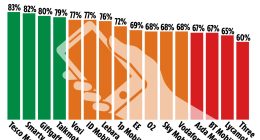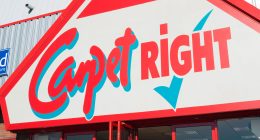Eggs Up Grill is a quirky, homegrown, Southeast breakfast chain. With new owners and a mandate to grow, the brand has a delicate balance to strike.
March 5, 2020 15 min read
This story appears in the March 2020 issue of Entrepreneur. Subscribe »
After the papers had been signed and the hands shaken, Skip Corn turned to his partner, Chris Skodras. “I don’t want to go cry in front of my wife,” Corn said in his distinct Southern drawl. “But I can cry in front of you.”
And he did. So did Skodras. “We cried every day for six months,” says Corn, 68. “To hand your baby off to somebody — it’s a traumatic experience.”
Over more than a decade, these two friends had built a 32-unit franchise called Eggs Up Grill, based in South Carolina. They wanted their restaurants to have small-town charm, so they ran the company with a small-town ethos. Everything was done with love and gut instinct. They answered the phones; they solved franchisees’ problems. They insisted that every franchisee also work in their restaurant so customers could come and shake the owner’s hand. And now Skodras and Corn had gone and sold the majority of their company to a private equity group, the kind of buyer that’s often demonized for slash-and-burn, profit-at-all-costs tactics.
Tears were understandable.
But so far, at least, Eggs Up is not looking like a private equity horror story. Instead, it’s looking like something far less dramatic, but a lot more common and instructive. It’s a tale of what happens when a company becomes too big for its founders and more experienced operators come in to wrestle with its full potential. The private equity group that bought Eggs Up Grill is called WJ Partners, and it has some experience in this game. It acquired Pure Barre in 2012 and eventually sold the fitness studio to bigger investors; by the time WJ fully exited in 2018, Pure Barre had exploded from 96 to more than 500 locations.
Related: 5 Tips for Expanding Your Small Business (The Right Way)
So if you live in the Southeast but haven’t heard of Eggs Up Grill — well, you’re about to. Shortly after the acquisition in 2018, the new owners installed a team of franchise veterans led by CEO Ricky Richardson, the former president of TGI Fridays. Eggs Up has already scaled to 40 locations and announced aggressive plans to reach 100 by mid-2022.
As it grows, Eggs Up will face a predictable question: How much can this growing company retain its authenticity? But that may not be the right way to look at it. Here’s another question that, in the end, might really be more important: How much of that authenticity was holding the company back?
Because the thing is, sometimes too much charm can be bad for business.
Rewind a few decades, and Eggs Up never looked like the kind of company on a path to private equity. Chris Skodras opened the first one himself in 1986, in Rhode Island. More than a decade later, he moved to South Carolina and brought his diner with him — reopening Eggs Up in Pawleys Island, S.C., just south of Myrtle Beach. It built a loyal following of families and beachgoers, and in 2005, Skodras decided to give franchising a shot.
That’s how he got talking to Skip Corn. The two men attended the same Friday morning Bible-study group, and Corn brought his kids and grandkids to Eggs Up every Sunday after church. Corn had just spent a career in management for the PGA Tour and was reinventing himself as a business consultant. In 2005, he signed a one-year contract with Eggs Up.
The duo became fast pals, and business thrived. “It was a friendship made in heaven, quite frankly,” says Corn. “He knew I was gonna do my job, and I knew he was gonna do his.” In time, Corn’s yearlong contract evolved into a 50-50 partnership. Skodras handled day-to-day operations; Corn took on accounting, marketing, compliance, and franchise sales.
There’s a story Corn likes to tell to illustrate Eggs Up’s franchisee-acquisition process — and, for that matter, the business’s entire ethos. One day, a guy named Michael McNeal calls up. He’s a UPS driver looking to start his own business. He already has approval for an SBA loan, so Corn drives seven and a half hours to meet McNeal near his home in Albany, Ga.
“I said, ‘Michael, what do you want to accomplish?’ ” Corn recalls. Before he could answer, the prospective franchisee’s wife cut in: “We want Michael to coach [his son’s] baseball team.”
Corn’s eyes lit up. Eggs Up Grill wasn’t looking for franchisees with restaurateur ambitions. It wanted regular folks like McNeal, who wanted to spend time with their kids. “What we focused on was character, morals, and ethics,” says Corn. “And we really felt like the Lord was bringing us good people.”
Related: What You Need To Know Before Starting A Franchise Business
Eggs Up grew slowly and steadily like this, signing new franchisees whose hearts passed the purity test. Many franchisees were drawn in by the brand’s guidelines: The restaurant would never open past lunch — its hours were 6 a.m. to 2 p.m. And franchisees needed to work in their store, meeting customers face-to-face. “Chris and I both knew we were never going to be gigantic doing it that way,” says Corn. “But we sure found incredible people.”
Still, the strategy also risked alienating incredible people.
One of them was Drew Hampton, a local who already was a multi-unit franchisee of Groucho’s Deli. He was a happy Eggs Up customer. The staff was unusually friendly; even the bussers were chatty. “They paid attention to the customer, and people are drawn to that,” he says. So he called Eggs Up and asked to become a franchisee, and in 2014, he opened the brand’s 11th store.
The place was an instant hit, with 600 to 700 customers visiting every Saturday and Sunday. Hampton was eager to open a second store — but Skodras and Corn weren’t interested. “If you want to open a second or third store, they’re not going to be successful,” he recalls them saying, “because you’re not going to be there.”
“I don’t want to own just one restaurant!” Hampton replied. “I want to own several and be able to scale something.”
At the time, Eggs Up had a strict rule. The on-site manager (who was usually the franchisee) had to own at least 10 percent of the franchise. Hampton could open a second location…but someone else would have to own 10 percent and work the floor. He didn’t want that.
This kind of friction isn’t uncommon in founder-run franchise systems, says Benjamin Lawrence, Ph.D., a professor of franchise entrepreneurship at Georgia State University. “The thing about founders is that they have a very different relationship to the brand,” he says. “They’re fundamentally interested in the brand as a reflection of their self-identity.”
It was true: Corn and Skodras valued personal relationships as much as growth. Over the years, Corn was contacted by several multi-unit operators looking to buy multiple locations, but he turned them down. “They don’t really know us, and we don’t really know them,” he reasoned.
In the end, Hampton relented. He found a partner and opened his second Eggs Up Grill as a part owner. On opening day, he says, nobody from corporate showed up. “They created a great brand,” he says. “But to take it to the next level, they needed help.”
Eventually, Skodras and Corn would agree — which is how they got to private equity.

Image Credit: Alvaro Dominguez
Over the years, private equity has taken a serious interest in franchising. Investment groups have acquired Buffalo Wild Wings, Ruby Tuesday, and the Texas chain Whataburger.
“Private equity likes franchising because they only have to invest limited amounts of capital for a high return,” says Lawrence, the Georgia State professor. Franchisees, of course, are the ones funding their locations, as well as managing employees.
For investors looking to scale fast, a company like Eggs Up Grill makes a decent proposition. It’s more nimble than breakfast titans like IHOP and Denny’s, and its restaurants require only about half the square footage. (Both IHOP and Denny’s are in the process of rolling out smaller concepts.) And because Eggs Up Grill offers limited hours of operation, serving breakfast and lunch crowds only, food and labor costs are lower.
But success is never guaranteed. Following a bad private equity deal in 2006, Quiznos lost 90 percent of its stores. And in 2010, private equity tried to scale Washington State’s Papa Murphy’s too fast. The plan backfired, and stores shut down.
“I’m not saying private equity is bad,” says Lawrence. “It can improve the system or get rid of low performers. But it does change the nature of the relationship.” When the strategy becomes hyperfocused on growth, decisions can become aggressive or risky.
But risk is relative. It’s a question of what you’re comparing it against. And in the case of Eggs Up, nonaggression was starting to look risky, too.
Skodras and Corn wanted to keep their organization lean and personal. For years, it was just the two of them, and even when they started growing, the corporate team never had more than five people, which meant nobody had assistants. They didn’t even have voicemail systems. “We answered the phone ourselves,” Corn says. But as they reached 20-plus locations, that tiny corporate team was stretched thin — and franchisees noticed. Sure, they could reach Skodras or Corn directly, but it could take days to actually get their attention.
Related: Our 41st Annual Franchise 500 Ranking
“They just didn’t have the infrastructure to be able to grow the brand like it was capable of,” says franchisee Scott Johnson. “They were more interested in quality than quantity.”
Around 2015, private equity firms started reaching out to Eggs Up. Generally, Skodras and Corn declined the meetings. They knew they were stretched thin, and they didn’t think they could do what these firms were proposing with five employees.
Then WJ Partners came along. It’s also based in South Carolina and had the personal connection Eggs Up valued: Corn knew Craig Wall, whose son, Benjamin Wall, is a founding partner. Through a friend, Corn met with Wall and his wife, Jaime, who’s also a WJ partner. “I was talking to people I knew, trusted, and felt comfortable with,” he says. Corn was also comforted by the fact that WJ Partners uses its own money; it doesn’t work with outside investors who might pressure it to break promises.
The Eggs Up deal took nine months to negotiate. Corn sat down with everybody at WJ Partners, “even people who weren’t going to be involved,” and pressed upon them the values of the company. He felt heard. And eventually, Skodras and Corn were ready to sign—and cry. Their baby was now officially someone else’s (though they retained a vested interest in the company, with no official roles).
The news came as a shock to many. “When I found out, I was very excited. WJ Partners has a solid background in scaling concepts,” says Hampton, the franchisee who had to give up equity in his second location.
The reality, he says, is that Eggs Up is easier to operate with private equity at the helm. In part, that’s because the new owners saw the chain very differently than the old owners. This wasn’t just a place driven by love and gut instinct anymore. Now it was a business meant to scale.
After the sale, WJ looked for a new leader to grow the company. It found that in Ricky Richardson, who had spent 20 years at TGI Fridays — including three as president. He learned a lot there but also saw what can happen when a brand loses clarity in its vision. It’s a problem for many legacy concepts and resulted in TGI Fridays closing 58 stores between 2014 and 2016.
“It’s hard to be all things to all people,” says Richardson. “The risk there is you end up diluting what you really stand for.” And a diluted brand is easy to attack. “What historically may have been indirect competitors end up being direct competitors,” he says. “You’re not as focused as you were in the past, so people can carve off little pieces of you.”
This is why he saw so much potential in a little breakfast brand. “What’s so appealing about Eggs Up Grill is the level of authenticity that comes with it,” Richardson says. He talks a lot about authenticity. It’s a little ironic, given the transformation he’s tasked with leading, but it’s clearly germane to Eggs Up’s messaging: We may be scaling, it seems to say, but we’re still the local guys.
“That connection is really differentiating and compelling for a guest,” Richardson says.
There’s also a difference between authenticity and, well, inefficiencies created by authentic founders. Since joining the company in July 2018, Richardson has made fast work of plugging those holes.
For example, the once-tiny corporate team is now a lot bigger. In the past, franchisees might have waited two days to hear back from someone. “Now if I call, somebody will answer in 30 seconds,” franchisee Hampton says. “They give you support on marketing, site selection, P&Ls — they look out for the bottom line.” Plus, he says, there’s no emotion involved. “It’s just business.”
Richardson also tightened up costs. Eggs Up used to have 72 menu items; now it has 55. He eliminated poor-performing dishes like tuna and egg
salad and negotiated better deals with vendors.
Last year, he also opened a training facility and new restaurant prototype in Spartanburg, S.C., not far from Eggs Up headquarters. The store demonstrates a refreshed, contemporary look, and it has already rolled out new, Instagrammable items: a shrimp and grits omelet, baked peaches and cream pancakes.
Related: Can Jon Taffer Fix Franchise Restaurants?
To ensure consistency, Richardson created a team of franchise consultants, who visit each store a few times each quarter to check food quality and ascertain how servers, managers, and bussers interact with guests and with the franchisee. “It’s nice when they stop by,” says franchisee Rob Johnson, who works alongside his brother, Scott. “It doesn’t feel like an inspection or anything hostile.”
But there’s no doubt about the purpose of the visits. The corporate office wants to ramp up profits and sell more stores. “We’re projecting plus or minus 18 restaurants opening in 2020, which, comparatively, is almost a 50 percent growth rate,” says Todd Owen, the company’s new VP of franchise development. “We actually opened five in January.”
Owen, who previously helped Qdoba Mexican Eats expand from 60 to 600 locations, says he was lured in by Eggs Up’s strong market position under WJ Partners. It’s well-funded, franchisees are stoked about the brand, and Richardson has stacked the new executive team with industry veterans.
Results are already visible. Recently, Eggs Up signed a 10-store multi-unit deal with a Wendy’s franchisee. “We want to be one of the big dogs,” says Owen. “But we’re not just wishing; we’re getting there.”
For now, Eggs Up will limit its growth to the Southeast. “I look at it like we can’t afford to make one mistake,” says Owen. Because if Eggs Up Grill becomes just another anonymous place to buy bacon and pancakes, what does it really have to offer?
The new challenge, then, is to figure out which parts of the old regime can help this new regime grow.
Corn has no regrets about selling. He likes the new changes and understands the value of having a big corporate office to handle the day-to-day operations. “Now instead of calling Skip for 50 percent of the answers and Chris for 50 percent of the answers, you can call one of 10 people and get somebody who’s an expert in that field,” he says. In a way, that’s what the two partners always wanted: better support for franchisees.
And unlike the old owners,
This article is from Entrepreneur.com









